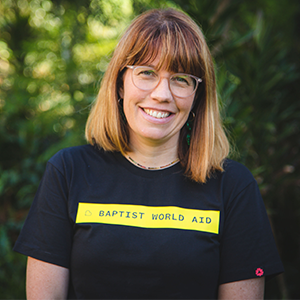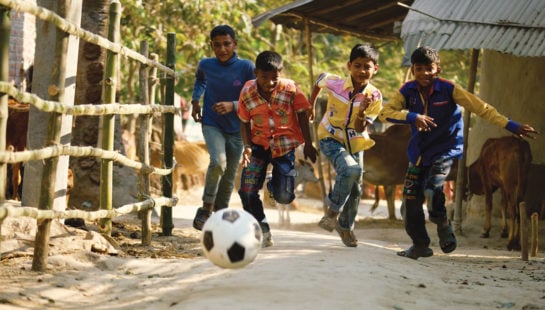The Bible tells many stories of young people who are faithful to God regardless of their age or status. Despite their lack of cultural power, they trust that God will provide what they need to follow him—and he does again and again.
For over 50 years now, Baptist World Aid has been both supporting children, and working alongside them to the benefit of their whole community. And while their youthful wisdom astonishes us at times, children don’t surprise God when they use their voices to advocate for others; when they help their communities address issues that keep them in poverty; or when they speak out drawing attention to injustice and marginalisation.
God is never surprised when children demonstrate remarkable courage.
Mark 9:36-37
‘He took a little child whom he placed among them. Taking the child in his arms, he said to them, “Whoever welcomes one of these little children in my name welcomes me; and whoever welcomes me does not welcome me but the one who sent me.”’
Jesus’ disciples have been arguing about who among them is greater. But Jesus surprises and compels them—and us—to look to children as our example. Taking a child into his arms, he tells us that welcoming and esteeming children is welcoming him. The tussle for greatness is moot because the last shall be first and the kingdom of God belongs to children (Matthew 19:14, Luke 18:16)—and those like them.
Isaiah 11:6
‘The wolf will live with the lamb, the leopard will lie down with the goat, the calf and the lion and the yearling together; and a little child will lead them.’
This image of is one of renewed creation, the Garden of Eden as it was intended to be in the beginning. In the new creation, peace reigns. And the Prince of Peace, who arrived as a vulnerable baby, initiated this peace during a time of earthy violence. Jesus is the child who will lead us into a kingdom of justice. He is the Living Hope who will restore creation and bring about peace. He will reconcile all creation, even the lions and lambs.
Genesis 21:14-19
‘“What is the matter, Hagar? Do not be afraid; God has heard the boy crying as he lies there. Lift the boy up and take him by the hand, for I will make him into a great nation.” Then God opened her eyes and she saw a well of water. So, she went and filled the skin with water and gave the boy a drink.’ (Genesis 21:14-19)
Like Hagar, our distress can overwhelm us. We can feel powerless whenever we see children in pain—especially our own little ones. But God speaks to us, as to Hagar, and reminds us he is in charge. He says—I have a plan for these children, get up, give them a drink—and then he provides the water. Hagar and Ishmael’s story delivers a powerful truth for rejected, oppressed women and their so called ‘unwanted’ children across the world. It’s a powerful reminder that God is always at work even in the most desperate of circumstances.
Genesis 37:12-35
‘“Here comes that dreamer!” they said to each other. “Come now, let’s kill him and throw him into one of these cisterns and say that a ferocious animal devoured him. Then we’ll see what comes of his dreams.”’ (Genesis 27:19-10)
Discarded and despised, Joseph’s life took a sharp turn at this moment. But when we read on, we see that God does not abandon Joseph. He was young, yet God had a plan for his long life. Injustice and exploitation stood in the way momentarily—but God was always, and is always, at work. When we look out at our world, young people are at risk, and injustice seems to target children. But we call to mind the closing statements of the book of Genesis, as Joseph reflects on the actions of his brothers (50:20), ‘You intended to harm me, but God intended it for good.’ We look to our good God whose eye is always on children, and on their future.
Exodus 2:1-10
‘When she could hide him no longer, she got a papyrus basket for him and coated it with tar and pitch. Then she placed the child in it and put it among the reeds along the bank of the Nile. His sister stood at a distance to see what would happen to him.’ (Exodus 2:3-4)
Miriam represents courage that resides innately in children to speak out for the sake of others. In this case, Miriam’s bold suggestion led to Moses escaping a massacre and spending his first year (or possibly two to three years) back in the arms of his mother. Imagine the deep exhalation of breath from Moses’ mother, when her extraordinary daughter came home to fetch her to nurse the baby—her baby. When we listen to children, solutions to complex problems can become clear, even problems that are literally life and death.
1 Samuel 17
‘And Saul said to David, “You are not able to go against this Philistine to fight with him; for you are a youth, and he a man of war from his youth”. . . David said, “The Lord, who delivered me from the paw of the lion and from the paw of the bear, he will deliver me from the hand of this Philistine.”’(1 Samuel 17:33 & 37)
David defeated Goliath with a pebble and a slingshot—the arsenal of a 15-year-old.
It can be easy to discount the experience of children, but David’s experience was that God had always delivered him from danger—even from lions and bears. And, as it turned out, David’s was the only experience that mattered. He defeated Goliath with a pebble and a slingshot—the arsenal of a 15-year-old. He faced a giant, standing in God’s strength, knowing it is the Lord who saves. This is a tenacious faith built on an experience of God’s faithfulness. Child-like faith says, God helped me then, he will help me now. It’s a simple trust we can all aspire to.
Jeremiah 1:1-12
‘The word of the Lord came to me, saying, “Before I formed you in the womb I knew you, before you were born, I set you apart; I appointed you as a prophet to the nations. . . Do not say, ‘I am too young.’ You must go to everyone I send you to and say whatever I command you. Do not be afraid of them, for I am with you and will rescue you,” declares the Lord.’ (Jeremiah 1:4 & 7)
God knew us before the thought of us crossed the minds of our parents. God knew Jeremiah and had planned, before he was born, for him to speak to the nations. These verses are a manifesto for children through the ages, and all around the world. God commissions them to speak because, before they were formed, he’d planned to help them lead others to himself. When God calls children into his purposes, his timing is his business. When Jeremiah felt afraid, God assured him of his abiding presence, his empowering spirit and then simply asked him to say what he saw. And when young people today step out in faith and say what they see, it can change the course of history. We would be wise to listen, and not say to them, ‘alas, you are too young.’
When God calls children into his purposes, his timing is his business.
Daniel 1:1-21
‘To these four young men God gave knowledge and understanding of all kinds of literature and learning. And Daniel could understand visions and dreams of all kinds. . . In every matter of wisdom and understanding about which the king questioned them, he found them ten times better than all the magicians and enchanters in his whole kingdom.’ (Daniel 1:17 & 20)
Young people across the world have spoken up for centuries upon seeing that something isn’t right. With youth, comes clarity about right and wrong that can become muddied as we age. Daniel aligned himself with God’s kingdom even when it stood in opposition to the kingdom of this world. His story assures all of us that when we speak up on behalf of the oppressed and marginalised, we are aligning ourselves with God’s values of peace, and justice for all.
Luke 1: 26-45
‘“I am the Lord’s servant,” Mary answered. “May your word to me be fulfilled.” Then the angel left her. . . Blessed is she who has believed that the Lord would fulfill his promises to her!’ (Luke 1:38 & 45)
The arrival of Jesus as a baby is the fulfillment of God’s covenant with Israel and his redemptive plan for humanity. And the story begins with a teenager. Though fearful at first, Mary is quick to surrender to the plan of her God. We can look to Mary’s faith and follow her humble example. With this child-like trust, we can say ‘yes’ to God. And we can participate in the ongoing rollout of God’s kingdom Jesus established here on earth, knowing it has nothing to do with who we are and everything to do with who God is in us!
Luke 2:41-52
‘When his parents saw him, they were astonished. His mother said to him, “Son, why have you treated us like this? Your father and I have been anxiously searching for you.” “Why were you searching for me?” he asked. “Didn’t you know I had to be in my Father’s house?”’ (Luke 2:48-49)
There’s a place for all of us in God’s house at any age. And there’s always a place for the questions of young people, for the unique perspectives they bring, and the unguarded curiosity that should define us all as children of God.
Though Jesus here is fully God, he is also fully man—or in this case fully boy. And in this way, this story is a gift to children. It’s an invitation to join the boy Jesus in the temple—to ask questions, and to pursue understanding. And for adults not to worry when they do, knowing their journeys will lead others to the integrity of truth.




 Sienna Corkill,
Sienna Corkill,